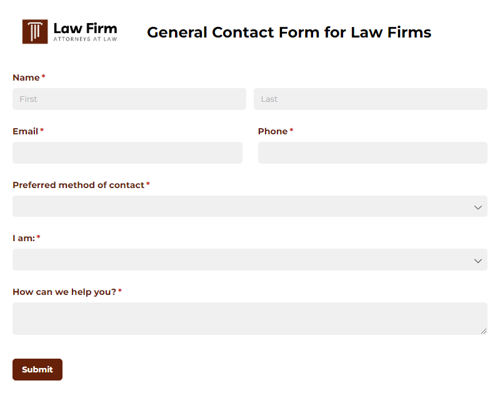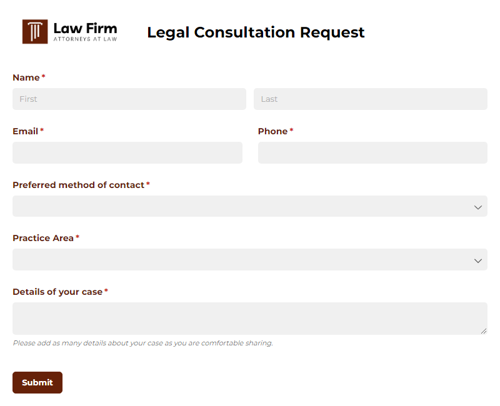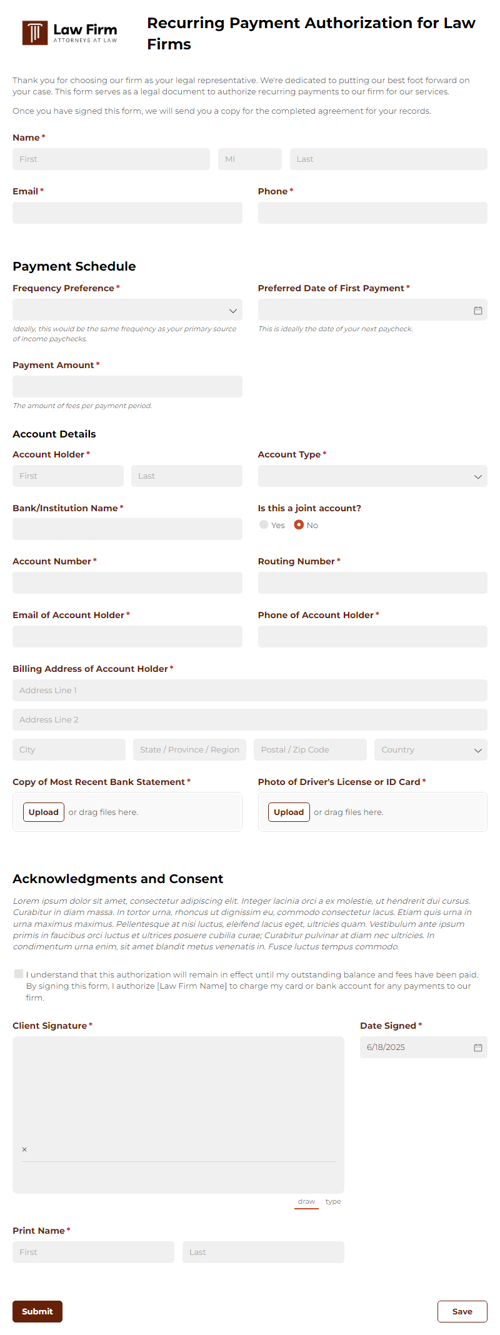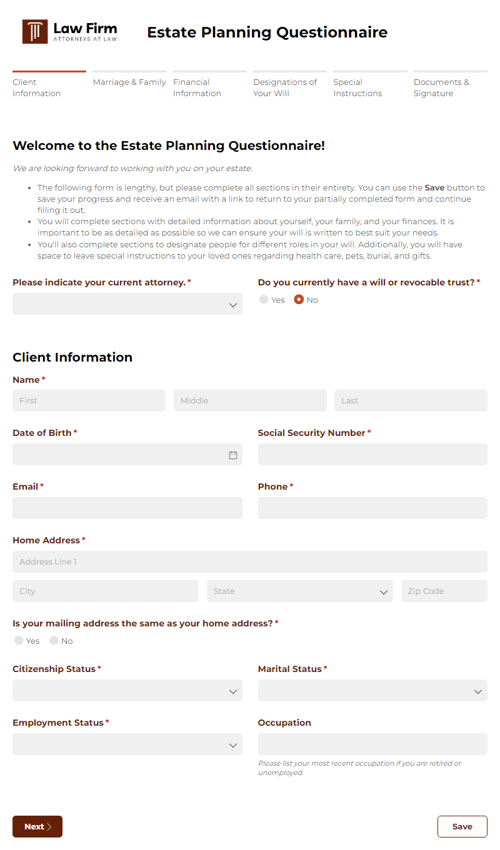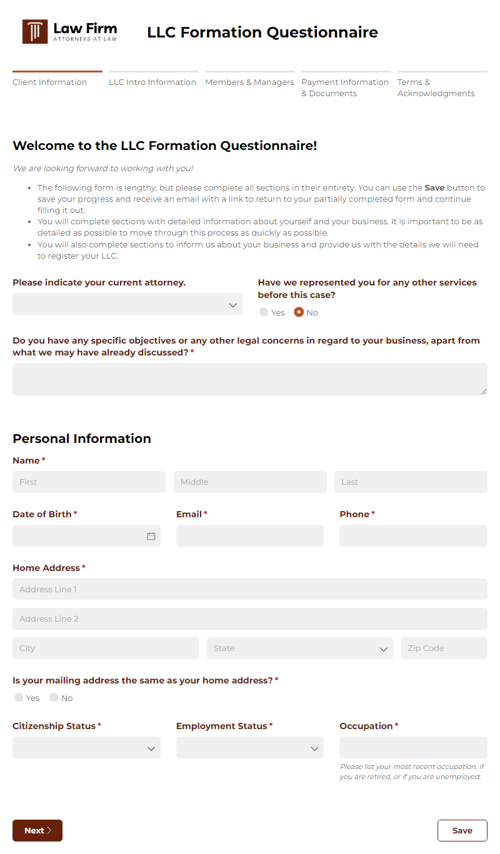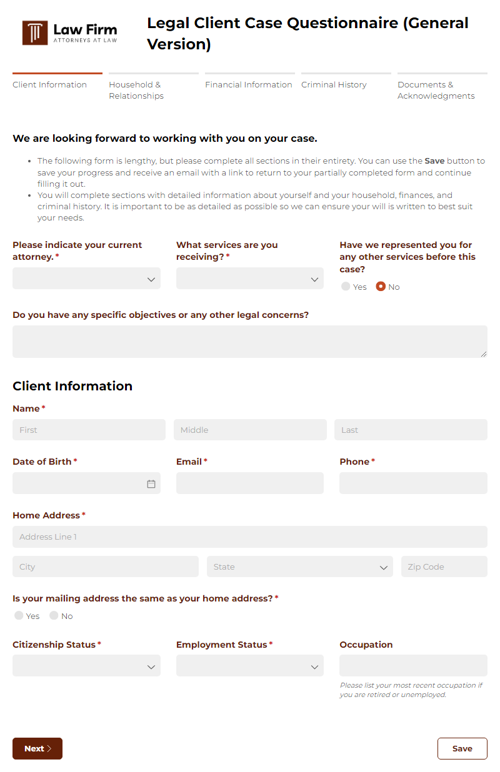Learn how our user-friendly online form builder can optimize your firm’s operations and simplify client data collection.
The legal industry has long been dependent on paper-based documentation, given that almost every law firm manages substantial amounts of paperwork and records. This paperwork encompasses a variety of materials, including agreements, contracts, client records, case filings, and everything in between. The nature of many client cases requires the creation of numerous documents and the completion of piles of paperwork, and the highest-performing firms prioritize keeping detail-oriented records of these.
Many legal teams invest significant time in managing and organizing their data. Relying on manual data and document management methods can result in delays with client cases, inefficiencies in internal processes, and increased administrative errors. These manual processes take valuable time away from staff that could be spent on more critical tasks. According to a study conducted by Protexure Lawyers spanning from 2016 to 2019, there has been a steady decline in the number of administrative errors per legal malpractice claim. This indicates that efforts to reduce these errors can result in less claims for legal firms, ultimately leading to saved resources and less potential complications. Fortunately, many of these administrative errors can be easily prevented by embracing technology that minimizes redundant data entry, automates document generation, and streamlines internal processes within your firm.
Benefits of Going Digital
Digital transformation is paramount in today’s rapidly evolving world. This shift towards digitization has touched every aspect of our daily lives, and the ability to access data anywhere, from any device, is becoming the norm. Despite this trend, the legal industry continues to lean towards traditional paper methods for many processes. Many firms don’t have the time to prioritize switching to new technology, since their existing processes are effective enough. Nevertheless, it’s crucial to view technology as a valuable complement to one’s work rather than a hindrance.
According to the 2024 US Midsize Law Firm Priorities Report by Actionstep, “administrative roles are becoming increasingly bogged down with tasks that might not be as efficiently structured or supported by the current technology in use.” This highlights the potential benefits of adopting the right technology for your firm. Doing so can result in streamlined processes, increased data and document accuracy, enhanced team productivity, and improved client experiences when working with your firm. Therefore, it is vital for your firm to embrace and prioritize the adoption of technology to remain competitive within the legal space and maximize your operational efficiency.
Increased data and document accuracy
"Human error during manual data entry can be as high as 40%"
Source: Raymond R. Panko
In the legal industry, maintaining accurate data is crucial since it forms the foundation for attorneys and clients to make informed decisions throughout their case. Unfortunately, data errors are inevitable, and research indicates that the likelihood of human error during manual data entry can be as high as 40%. On top of this, the more often we manually transfer data from one system to another, the more this rate compounds on itself, resulting in an even higher probability of errors.
Since human errors and typos are inevitable, it is important to reduce the opportunities for inaccuracies in legal processes wherever possible. One way to do this is to transition to digital processes and automated data transfers in many points throughout your processes. Doing so can have significant positive implications for your firm, such as reduced delays and decreased workloads for your employees. When adopting automation technology and cross-platform data integrations, you can significantly increase the accuracy of stored data and documents created by your firm.
Enhanced productivity
Based on a report by Wolters Kluwer, an overwhelming 91% of legal professionals acknowledge the significance of technology in their daily work, especially in terms of saving time and boosting productivity. Technology provides many teams with easier access to resources and automation in their processes, enabling them to allocate more of their time towards strategic work and putting them back in the driver’s seat of their firm.
Many modern systems provide centralized, cloud-based data storage, improving the accessibility of resources for staff members. They enable teams to access their data from any location and by multiple staff members simultaneously, saving them a significant amount of time. The ability to quickly search for cases, files, and virtually anything else leads to much faster retrieval of necessary information compared to traditional paper-based or locally stored digital filing systems. Additionally, storing client case details in one centralized location often reduces the need to rely on assistance from others to find any necessary materials.
In today’s fast-paced world, numerous technology platforms are equipped with advanced automation capabilities that play a huge role in minimizing the time spent on repetitive tasks. For instance, document generation software takes existing data and quickly drafts legal documents in seconds, eliminating the need to manually create documents. Similarly, time and billing software can automatically send invoices for billable hours, streamlining the invoicing process. Furthermore, workflow automation software can make operations more efficient by automatically assigning tasks and sending client emails. These changes allow your staff to dedicate their time to more impactful work, ultimately boosting overall productivity.
Streamlined client experiences
A key advantage of incorporating digital technology in the legal industry is the ability to enhance your overall client experience. While increasing efficiency and productivity are undoubtedly essential, ensuring that your clients have seamless interactions with your website and services is equally important. As Triio emphasizes, “The benefits of law firm technology are not just about convenience. By improving efficiency and productivity, it enhances the quality of legal services, enabling faster response to client inquiries, better deadline tracking, and more effective case management. In essence, technology is not just a tool for managing work; it’s an essential tool for improving your legal practice.”
A firm’s digital transformation initiatives are crucial for both attracting clients and nurturing strong, lasting relationships with them. Technology has greatly impacted how firms interact with clients by offering more accessible methods of communication, form submission, and digital document signing. Implementing software in your firm can automate various external processes and communications, ultimately enhancing client loyalty. According to the 2021 Wolters Kluwer Future Ready Lawyer Survey, which surveyed 700 legal professionals across the United States and nine European countries, “63% of law firms say they will increase their technology investment,” while “74% report they are investing in new technology to support firm operations and client work.” This is a common trend within the legal space, with firms of all sizes actively prioritizing technology to improve their client relationships.
How your firm communicates with clients is essential in shaping their overall experience. Traditionally, firms spend a large amount of time managing emails, sending updates and reminders, and scheduling appointments. Technology can streamline these processes, reduce client wait times, and improve communication. A form-building platform with integrated workflow automation features, like Cognito Forms, can automatically notify you of client requests as they come in, enabling your team to respond promptly and begin working immediately. Furthermore, these platforms can automate various actions and email responses, assign tasks to team members, and provide clients with a straightforward way to submit documents. By addressing your clients’ diverse needs, you can greatly enhance their experiences and relationship with your firm.
Selecting the right legal software for your firm
Choosing the right technology platform for your firm’s needs is essential when looking to embrace legal technology and transitioning to a paperless office model. With various options available, it’s important to ensure that the technology you use complements the firm’s practice area and overall needs. Some examples of different platforms include online form builders, practice management systems, document automation systems, and legal CRMs. By effectively utilizing the right technology, law firms can optimize their internal systems through automation and enhance the quality of their legal work.
"74% of law firms report they are investing in new technology to support firm operations and client work."
Source: Wolters Kluwer
Why is Cognito Forms an Effective Solution for Law Firms?
Cognito Forms stands out as a highly effective solution for law firms looking to improve their operations and streamline their processes. With its robust automation and workflow capabilities, Cognito Forms excels at helping law firms efficiently collect data from clients and automate internal operations, eliminating manual tasks, all while remaining extremely affordable.
One key feature that sets Cognito Forms apart from other form-building products is its ease of use and user-friendly design. Our intuitive platform is accessible to legal professionals of all technology skill levels, enabling them to create forms, surveys, and questionnaires with ease and minimal training. This ease of use has been consistently praised by many of our customers, particularly those in the legal sector, as a key feature that sets us apart from our competitors. Let’s now take a deeper look at what exactly makes Cognito Forms so easy to use:
- Drag-and-drop form builder: We work hard to ensure our platform is easy to use, regardless of one’s technical abilities. Our intuitive drag-and-drop interface makes it incredibly easy for anyone to add, delete, and arrange form fields to build a customized form within minutes without writing any code.
- Advanced features and capabilities: We provide a wide range of advanced features and capabilities to further enhance your forms. These include Workflow, conditional logic, calculations, and more. These advanced capabilities provide additional opportunities to streamline your processes by automating manual tasks and reducing your firm’s busy work.
- Available on any device: All forms created in Cognito Forms are automatically optimized for various devices–desktops, mobile phones, tablets, etc. This ensures your users can easily complete any forms you build from any device without complications or extra work on your end.
- Pre-built templates: For users who may be new to Cognito Forms and need help knowing where or how to start, we provide you with a range of templates for forms common in the legal industry. You can easily customize any template to fit your specific needs in terms of fields, content, design, and layout. This makes it extremely easy for you to get up and running with our platform without a significant learning curve or extensive training.
- Integrations with your current systems: If you store client data in other systems, you can seamlessly integrate your data collected in Cognito Forms with your firm’s current processes and operations. Our enhanced data integrations, such as our third-party integrations or the Cognito Forms API, enable you to trigger automated operational actions or transfer data wherever needed. This helps improve the accessibility of your data while providing the convenience and user-friendly experience of Cognito Forms.
Research and Customer Insights
Over the last couple of years, we have introduced numerous new and powerful features. Recognizing the diverse ways our customers use our platform, we find it important to provide comprehensive templates tailored to specific needs within different industries. Many of our customers participate in various complex processes throughout their workweek. To help them get started quickly and effectively, we have built practical starting points for customers to use when creating new forms. Not only are these templates helpful when learning the product and building new forms, but they also demonstrate exactly how Cognito Forms can simplify daily tasks, streamline processes, and keep your team focused and on track.
To create these templates, we invested significant time researching and exploring various aspects of the legal industry and how our customers leverage Cognito Forms to enhance their firms. The most powerful part of our process, though? The live, virtual interviews we conducted with attorneys, paralegals, practice managers, and more! These interviews helped us understand all the moving parts involved in a client’s lifecycle. Our customers also shared their favorite and most frequently used features of our platform, as well as how Cognito Forms impacts their work. This allowed us to personally interact with our customers and gain valuable insights into what law firms need and want from our platform. Inviting customers to be a part of creating templates has been a powerful and rewarding experience for us.
Based on this research, we are excited to introduce our new research-based templates for law firms. These templates go beyond the average form templates as they are backed by research and have been tested by real customers who use Cognito Forms to complete tasks at their firms. All while including powerful pre-built configurations for standard processes within the legal space. These innovative templates will help you streamline your firm’s internal processes while also enhancing your client experiences.
Jidé Afolabi
Owner
Afolabi Business Law Professional Corp.
How Law Firms Use Cognito Forms
There are several different practice areas within the legal industry, each doing vastly different things for their clients. Cognito Forms provides law firms, of any practice area, with a form builder to create forms built for their needs. Not only is Cognito Forms powerful and versatile, but it’s one of the easiest form builders for anyone to use, regardless of their technical expertise. While tech-savvy users create sophisticated forms and Workflows, even those with limited technological skillset learn the platform quickly to create forms that meet their unique needs. Even the least tech-savvy customers can often take advantage of our advanced features as they continue using the platform.
Legal teams use Cognito Forms for so many different things. Some use our platform to embed brief online contact forms on their website to easily capture leads, while others create comprehensive questionnaires to gather all the details about clients’ legal cases. Some even create forms to collect data that correspond with placeholders in their document templates to create legal agreements, engagement letters, contracts, estate plans, and more. They automatically generate these documents using the form and their own custom document template. The possibilities with Cognito Forms are endless, and there are many different ways legal teams can use the platform, even with a single firm.
From straightforward contact and intake forms to comprehensive case questionnaires and agreement documents, Cognito Forms provides an easy-to-learn, intuitive platform for digital data collection and workflow automation at any stage of the client’s lifecycle.
Client acquisition
The first stage in a legal client’s lifecycle is the client acquisition stage. When individuals who need legal representation begin their search for an attorney, they often start by exploring the websites of various law firms to make an informed decision. This begins the legal client’s lifecycle in the first stage, the client acquisition stage. During this stage, it’s important for potential clients to feel confident that your firm can manage their case and that you, as their attorney, possess the expertise and experience to get them the resolution they seek. Ensuring a professional website that highlights your legal expertise is the number one way to demonstrate to clients that your firm is the best choice for their needs.
Having a professional website is great for showcasing your expertise and legal services, but if it’s difficult for clients to get in touch with you, you could be missing out on potential business. According to River Journal Online, an attorney’s “contact form should be easily accessible to facilitate inquiries and consultations.” By making it effortless for your website visitors to request a consultation or reach out to you, you can significantly increase the amount of leads you’re able to generate for your firm.
Peter Herrera
Marketing Director & Office Manager
Rehmani & Associates
One firm’s strategy for processing client requests faster with Cognito Forms
Attorneys and legal teams are increasingly recognizing the impact of technology on their operations. As part of their initial digital transformation efforts, many are incorporating online contact forms into their websites. For example, Peter, who oversees Cognito Forms for Rehmani & Associates, relies on this technology just like this. Rehmani & Associates specializes in providing legal services such as elder law, estate planning, probate, conservatorship, and more to clients in Southern California. Cognito Forms is integral to many aspects of their work, from simple contact forms to comprehensive case questionnaires.
Peter has embedded both a contact form and a consultation request form directly on their website, and he receives inquiries from prospective clients weekly. Their contact form features additional questions that are revealed using conditional logic as a client answers more questions, such as indicating that their inquiry is a consultation request. By doing so, clients can provide essential information beforehand that would typically be covered during the initial intake process. This approach allows them to quickly assess whether they can assist the client and provide pricing and other relevant information in their initial email, rather than going back and forth. Peter says this setup works great for them and states, "By asking additional questions for consultation requests, we’re really able to expedite clients’ requests and streamline our intake process.”
Alongside using conditional logic to streamline their processes, Peter also uses custom data integrations to send their collected data to their legal CRM. With webhooks, he has set up the automatic creation of new client matter and contact information directly in their CRM, significantly reducing the amount of manual data entry necessary. Custom data integrations put their forms to work for them, ensuring that they’re able to operate as efficiently as possible. Peter loves Cognito Forms, saying, “It’s one of my favorite software to use because you guys have done a good job making it really easy for the user. You’re also one of the most robust and affordable software out there.”
Start collecting online inquiries using templates made just for law firms.
To help you start collecting inquiries more efficiently, we’ve designed general contact and consultation request forms tailored specifically for law firms. Each template offers your visitors a convenient way to get in touch with you without having to leave your website by embedding the form directly on your site. Your office staff can make notes alongside each request while tracking each inquiry's status, all in one place. Regardless of your technical expertise, you can easily add more questions with conditional logic that meet your needs.
Client intake and conversion
The next phase in the client lifecycle is client intake. The first step in this stage is adding the prospective client to your Client Relationship Management (CRM) system so you can continue with the remainder of the client intake process. During intake, it is crucial to thoroughly evaluate whether the client’s specific needs align with your firm’s areas of expertise. Additionally, this stage gathers a set of comprehensive information to help ensure the early identification of any potential conflicts of interest before progressing with the case.
Client intake not only evaluates whether you can take a potential client’s case but also plays a significant role in shaping the client experience. To effectively facilitate this, it’s vital to ensure you have a well-structured intake form that captures all the information needed for the initial consultation. By gathering all the relevant details upfront, you can streamline the entire process and avoid the need to chase down information later. This approach not only saves time but also helps ensure alignment between the client’s needs and the services offered by the firm, ultimately leading to better outcomes for both the client and the firm.
An online form builder like Cognito Forms can significantly simplify your client onboarding process during intake. In the legal industry, numerous forms and paperwork, such as engagement letters and fee agreements, need to be completed before an attorney can begin working on a case. By collecting data digitally, you can integrate it into your operations, automating some of the routine tasks your team handles. With document generation capabilities, the data from completed intake forms can be used to automatically draft engagement letters, fee agreements, and other necessary documents using templates you’ve tailored to meet your specific needs.
How our legal customers streamline intake and conversion with Cognito Forms
Since 1979, Hickman Lowder has been meeting the legal needs of children and adults with disabilities, the elderly, and their families. Over the years, they repeatedly found themselves looking for a solution to make their phone intake process more efficient and consistent. During their intake process, secretaries ask potential clients several questions to gather information about them and their cases.
After switching to Cognito Forms, their team’s intake process improved significantly. Their secretaries now go through the intake form efficiently while speaking with clients on the phone. Their favorite aspect of the form is that only the questions relevant to the client’s case appear, making data collection smoother and the form easier for staff to complete. Once all data is entered, secretaries select appointment times and office locations, triggering the automatic assignment of the respective attorney to the case. To further enhance their workflow, they added automatic email notifications that are sent to the client when the form is submitted. This email includes an appointment confirmation, links to additional forms, their virtual meeting room, and payment, and even specific directions to the office based on their selected location. Since their adoption of Cognito Forms, they’ve been able to complete many intake phone calls more efficiently.
Not only does Cognito Forms work well for client intake forms, but it also streamlines certain documents used during the intake process, such as engagement letters, fee agreements, and even more substantive legal documents. LawHawk regularly generates the first draft of various legal documents automatically upon submitting a form, using our document generation feature. LawHawk is a legal operations and automation business dedicated to helping other lawyers improve and automate their processes to save time and increase their work’s overall quality and compliance. Their emphasis on customization empowers legal professionals, giving them a sense of control over their processes.
Their team has helped numerous legal teams create personalized forms that automatically generate the first draft of legal documents—these range from simple engagement letters and fee agreements to more complex legal contracts and agreements. Many of the workflows they build enable legal teams to look at the automated first draft and decide whether they want to make any changes or send it to someone else. They also use Cognito Forms’ integration with Microsoft Power Automate to automate digital signing and more. These automated processes significantly reduce the time their clients spend sending emails back and forth, providing legal teams with greater efficiency and productivity. According to their co-founder, Gene, “Not having those delays back and forth will be more valuable than the amount of time you originally think you’re going to save by simply filling out a form.”
On top of all of this, Cognito Forms has become a key component in LawHawk and their law firm customers’ transition to a more modern business model—subscription solutions. Firms have found that their clients are happy to pay for these sophisticated self-service solutions rather than paying a traditional hourly rate for services. Cognito Forms is an integral component in saving attorneys time generating documents and opening up new doors for the way they provide services to their clients.
Automate legal documents and streamline client intake with our legal form templates.
We have developed a comprehensive legal client intake form designed to enhance your client intake process and help your firm run efficiently. This form can seamlessly integrate with your legal CRM to facilitate the creation of client contacts through any of our trusted third-party data integration partners. Additionally, we offer the flexibility you need to establish a custom integration using our webhooks or the Cognito Forms API .
In addition to the client intake form, we also provide a template for a legal engagement letter and fee agreement form alongside a recurring payment form, tailored to the needs of law firms. The engagement letter template collects information from your clients and automatically generates a professional legal agreement, which can then be shared with your clients or filed for future reference. The recurring payment form is equipped with all the necessary fields to set up a recurring payment plan for your clients. We also offer online payments through reputable platforms like Stripe, Square, and PayPal.
Case management and delivery
The next stage in a legal client’s lifecycle, case management and delivery, is crucial for ensuring that the client’s case is handled effectively from start to finish. During this stage, law firms gain a deeper understanding of the case and apply any insights they learned in the previous stages to manage it effectively. At the same time, clients become more familiar with the firm’s operations and attorney’s approach.
Communication between the attorney and client is essential here, with much of this stage involving the transfer of case information between the two parties through forms like case questionnaires (e.g., estate planning, bankruptcy questionnaires) and document upload forms. As this article by Wolters Kluwer rightfully states, “Whether these cases are fully managed by lawyers or partially by paralegals, finding ways to be efficient, organized and precise are paramount. After all, managing cases effectively has a direct impact on their outcomes, which impact your ability to retain and attract clients.”
After receiving the full details of a case from their client through the questionnaires, legal teams then work to determine a tailored strategy for handling the case and meeting the client’s objectives. Next, they gather all necessary client documents, transcripts, and evidence relevant to the case. Depending on the nature of the case, the legal team will then gear up for court appearances or negotiations, begin drafting legal documents such as agreements and motions, and submit documents to any necessary institutions. Throughout this stage, maintaining regular communication with the client is vital to ensure they are updated on progress, upcoming deadlines, and recent developments. Much of this stage revolves around having a sound legal strategy in place when managing your clients, and a digital platform like Cognito Forms is a great supplement to your current technology stack.
Christi Leinart
Chief Operations Officer
Leinart Law Firm
One customer’s approach to creating in-depth questionnaires using Cognito Forms
Christi Leinart, the Chief Operations Officer at Leinart Law Firm, first came across Cognito Forms while searching for different solutions for their legal needs. Her role encompasses a mix of different areas, such as marketing and operations, and her primary responsibility revolves around improving the various processes and systems at the firm. She seeks ways to simplify tasks for employees and customers, making it easier for both parties to complete their work efficiently and communicate with each other easily.
Leinart Law Firm specializes in helping clients with bankruptcy and debt solutions. One of the primary ways they use Cognito Forms is for their bankruptcy questionnaire, which allows them to gather the information they need from the client to create a petition and get started on a case. After clients complete this form, they theoretically have all the information they need to begin handling the case and filling out the detailed bankruptcy documents in this legal process. In terms of their bankruptcy process, Christi mentions how Cognito Forms has greatly helped them digitize and automate many of the previously manual tasks for both their clients and the internal staff.
They first started using Cognito Forms because of the digital need that arose due to the pandemic. Previously, their clients completed this questionnaire on paper where they wrote everything out, and after COVID-19, they transitioned to a fillable PDF format. While that did help make the process more digital, new issues arose. They’d have some clients who weren’t as tech-savvy and would complete the form, thinking they had saved the information when, in reality, nothing was actually saved. Because of these issues, they transitioned to an online form-building platform. Christi tried other form builders, but ultimately chose Cognito Forms because of our highly intuitive platform and advanced capabilities. This switch has been a game changer for them! Christi mentions that conditional logic is the most helpful feature for their firm, and she loves how they can control how much a client sees on the form based on their previous answers. She states, “I love Cognito Forms. We looked at several different platforms, and it just made the most sense and is the most robust. I also like the Page Break feature that makes our form seem not as long, and clients can see their progress as they work through it.”
Begin gathering case details and documents from your clients.
Our collection of questionnaire templates is the perfect way for your firm to get started using Cognito Forms. We’ve developed an estate planning questionnaire and an LLC formation questionnaire that can be directly used for law firms specializing in those practice areas. For those of you looking to create a custom questionnaire for your firm, we also have a general case questionnaire that serves as a great base and can be specifically tailored to fit any practice area. You can modify, add, or delete any fields as necessary.
Client loyalty and retention
The final stage in a legal client’s lifecycle is the client loyalty and retention stage, which focuses on ways to value and retain the clients who have trusted your firm in the past. Making a strong impression and fostering positive relationships, even after a case ends, is key to having repeat clients and gathering new leads. Personalizing the customer experience is one way law firms can significantly boost client loyalty and retention. In an article published by Forbes, Chauncey Crail and Rob Watts suggest that firms “send a thank you email offering discounts on other items your customer viewed or give them an early heads-up on coming sales. Converting a customer again can give you further insight into what is and isn’t working for your brand.”
In addition to maintaining strong relationships with your clients, gathering feedback to identify areas for improvement as your firm grows is just as imperative. Incorporating feedback at every stage of the client lifecycle helps monitor and enhance the client experience as they interact with your firm. Both positive and negative feedback are extremely valuable and should be considered when making improvements to the client’s life cycle. An important way to gather this feedback is to use client satisfaction surveys. These surveys are a key tool for gauging client sentiment and can provide insights to improve your business plan by highlighting your firm’s strengths and shortcomings.
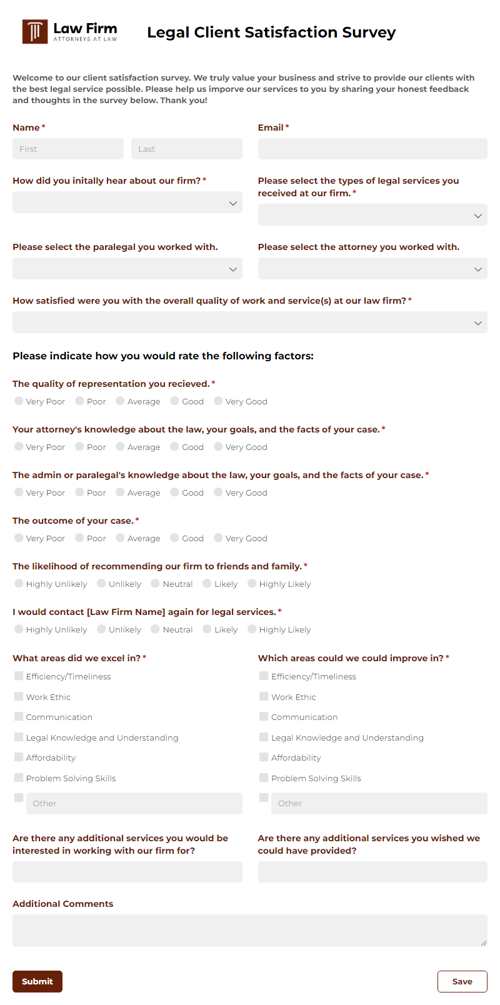
Legal Client Satisfaction Survey
- Conditional Logic
- Connected Employee List Form
- Automatic Email Notification
Client satisfaction surveys offer both internal and external benefits for law firms. Easy to administer and conduct, they demonstrate a firm’s commitment to growth and innovation through client feedback and suggestions. A firm’s willingness to grow not only helps retain current clients, but also attracts new ones via word-of-mouth. Many clients appreciate the opportunity to share their input, which is valuable for the firm and future clients. The article, “Making the Most of Law Firm Client Surveys,” says it well: “Since 2020, nearly half of all businesses have said that customer experience, rather than price or quality, was their first priority. This is because customer experience is the most likely indicator of repeat clients or a referral. Simply put, clients want a good experience, and directly asking them about it is the surest way to know where you can improve.”
Start gathering client feedback using our template specifically built for law firms.
Our pre-built legal client satisfaction survey template is a great way to get started with using our platform. Clients can share feedback about their experience working with your law firm in a simple and digital manner, and law firms can use our advanced sorting & filtering capabilities to analyze the results. This survey was created using various aspects of our platform, such as Rating Scales, Choice fields, and Yes/No fields, and can easily be customized to match the needs of your law firm.
Boost Your Legal Team’s Productivity with Cognito Forms
Making changes to your processes can feel nerve-wracking and overwhelming, but Cognito Forms provides you with a user-friendly platform for building custom forms that fit your legal needs. Beyond being a form-builder, our platform enables your legal team to work more efficiently by automating workflows, tracking the status of requests, and reducing manual data entry. This increases accuracy, streamlines client operations, and empowers your team to focus on the tasks that matter most, ultimately boosting overall efficiency for your law firm or legal institution.
